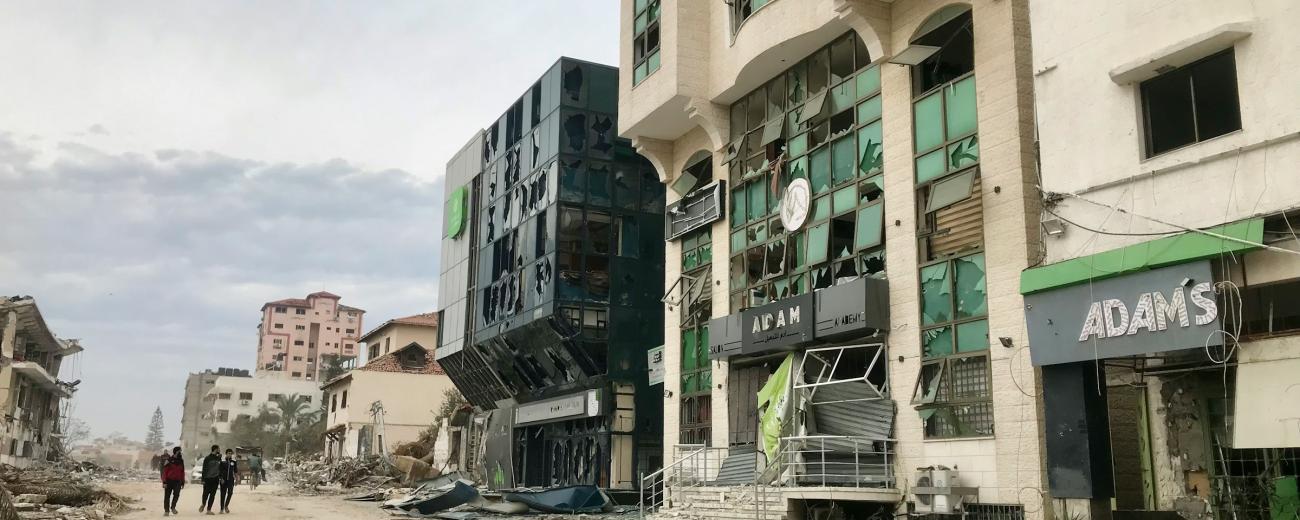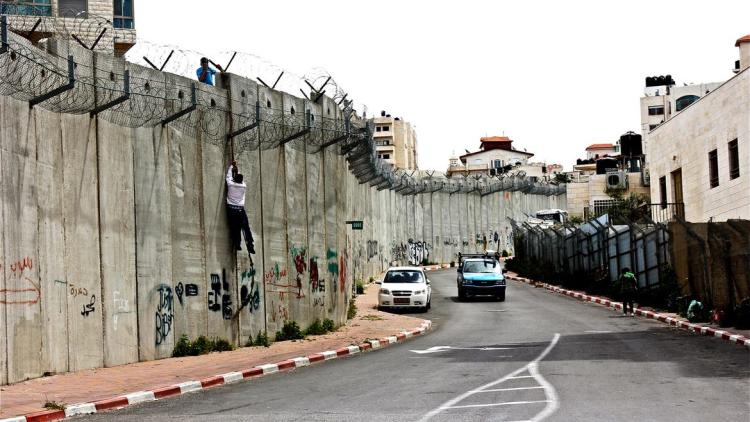
CPS Annual Lecture 2024: Gaza media worlds; beyond enclosures

Key information
- Date
- Time
-
6:00 pm to 7:30 pm
- Venue
- Brunei Gallery, SOAS
- Room
- Brunei Gallery Lecture Theatre (BGLT)
About this event
This year and given the political and ethical implications of the visual and mediated ongoing catastrophe in Gaza, the CPS annual lecture will this year take the form of a roundtable bringing together three experts working on the intersection of communication, politics, borders, technologies, and culture in the Arab World.
Each speaker will attend to Gaza, now and in the future, by focusing on its media worlds from different entry points.
Recording
Photo by Emad El Byed via Unsplash
About the speakers
Khaled AL-Hroub is associate professor in residence of the faculty of liberal arts at Northwestern University in Qatar. His focus is Middle Eastern studies and politics with particular interest on Islam and politics, Arab-Israeli conflict and Arab media studies. Hroub was a research associate at the Centre of Islamic Studies of the Faculty of Asian and Middle Eastern Studies, University of Cambridge, where he was the founder and director of Cambridge Arab Media Project (CAMP) until 2012. He authored Hamas: A Beginners Guide (2006/2010), Hamas: Political Thought and Practice (2000), and edited Political Islam: Context versus Ideology (2011) and Religious Broadcasting in the Middle East (2012). In Arabic he published Fragility of Ideology and Might of Politics (2010), In Praise of Revolution (2012), The Anxious Intellectual versus the Certain Intellectual (2018). Hroub also published in prose and poetry, and his publications in this area include Tattoo of Cities (prose, 2008), Enchantress of Poetry (poems, 2008), Ink of the Sun (prose, 2016), and I Slap the Face of the Sky and Go on (Poems, 2017). Between 2000 and 2007 he was the host of a weekly book review program on Al Jazeera. His academic writings appeared in Middle East Journal, Middle East International, Journal for Palestine Studies, Shu'un Arabyya (Cairo), Critique: Critical Middle Eastern Studies, Holy Land Studies Journal, New Global Studies, The International Spectator (Rome), Outre Terre (Paris), Internationale Politik (Berlin). His weekly articles appear in Arab dailies (Jordan, Qatar, Egypt, UAE, Oman, Palestine, Mauritania and the UK); he has also been published in the Daily Star, International Herald Tribune, El Pais and La Razon, and is a frequent writer for OpenDemocracy.com and Qantara.de.
Helga Tawil-Souri is Associate Professor of Media, Culture and Communication; Associate Professor of Middle East and Islamic Studies and Director of Graduate Studies at New York University, NY. She works on issues to do with technology, media, culture, territory and politics in the Middle East, with a particular focus on Palestine-Israel. Her work seeks to challenge the notion of an open and borderless world by looking at how technologies and their infrastructures -- such as cell phones and the internet -- impose new forms of borders and controls and work in explicitly territorial and political ways. She is equally interested in thinking about how spaces and 'things' that are overtly territorial and political -- borders, checkpoints, and identification cards, for example -- themselves function in cultural ways. Helga has published a wide range of peer-reviewed articles and invited chapters. She is co-editor of the 2016 book Gaza as Metaphor and is currently working with Dina Matar on a volume tentatively titled Producing Palestine. She has researched and written on Arab media; Palestinian cinema, television, video games and popular culture; telecommunications and internet infrastructure and development in the Palestinian Territories; cultural/territorial politics, checkpoints, identification cards, and surveillance in Palestine-Israel; as well as other topics. Most recently, Helga has been experimenting with visual forms of expression and especially collage. Helga teaches courses at undergraduate and graduate levels on topics including borders and spatiality, Arab media, critical theory and media studies, Israel/Palestine, war and media, globalization and international development, public humanities, Middle Eastern cities and urban spaces, and what has been referred to as "the coffee class" (cultural geography of commodities), which is not always about coffee. Before academia, Helga worked as a researcher and strategic analyst at a multinational media conglomerate and as an internet consultant. She has lived in various parts of North America, Europe, and the Middle East, which has resulted in border-crossings of various kinds, an obsession with im/mobility, and the ability to fluently communicate in six and a half languages. Helga has spent lots of time behind a camera, as a photographer and documentary filmmaker.
Dina Matar is professor of political communication and Arab Media and chair of the Centre for Palestine Studies at SOAS. She has published widely on Palestine, memory, oral history, Islamist politics, Hizbullah and strategic communication in Syria. Her first monograph “What it Means to be Palestinian” is a composite narrative, or a people’s history of Palestinians before the Nakba to the 1993 Oslo agreement, which formed the basis for an award-winning Norwegian animation movie called the Tower. She is currently working on a sequel bringing this composite narrative to the present. Dina has published in several journals and in media spaces. She is co-author of the Hizbullah Phenomenon: Politics and Communication; co-editor of “Narrating Conflict in the Middle East” and “Gaza as Metaphor” with Helga Tawil Souri. Along with Helga Tawil-Souri, she is completing an edited volume “Producing Palestine” due to be published in 2025. Her work and teaching are interdisciplinary intersecting communication, politics and cultural studies with a focus on marginal and neglected voices, informal politics, political communication, diaspora politics, memory studies and media activism, among others. Dina is founding editor of the Middle East Journal of Culture and Communication and the new book series “Political Communication and Media Practices in the Middle East and North Africa.” She is also co-editor of the SOAS Palestine Book series. Before academia, Dina worked as a foreign correspondent in the Arab world and editor covering Europe, Africa and the Middle East based on London.
Registration
This event is free to attend, but registration is required. Please note that seating is on a first-come, first-served basis.



